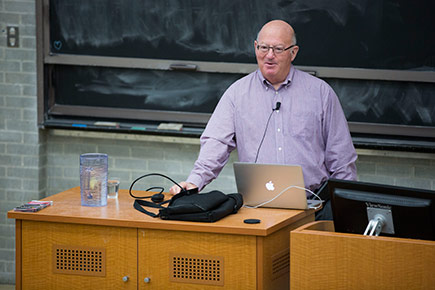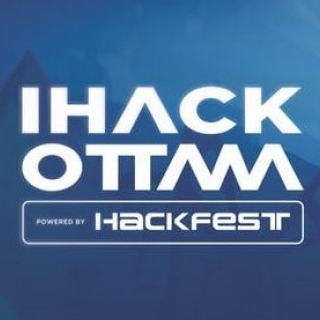TIM Lecture Focuses on Computer Storage Explosion
By Joseph Mathieu
Dave Thomas, software engineering veteran and adjunct research professor at Carleton University, delivered the Technology Innovation Management (TIM) Lecture on March 8. His talk centered on the advent of massive memory storage and how it will affect the computer industry.
“Nowadays, it’s impossible to buy a machine with less than 128GB of memory, maybe even 256GB,” said Thomas. “By 2018, if not earlier, I think we’ll see a laptop with 10 terabytes of memory for under $1,000.”
New developments mean new jargon, and where once engineers worked with megabytes and gigabytes of storage, now they talk of terabytes and petabytes.
If an average MP3 song is 3.5MB, you’d need close to 300 million songs to fill one petabyte of storage. In 2013, Netflix announced that their entire database of TV shows and movies used just over 3PB of cloud storage, which could now fit in your pocket thanks to a single memory drive recently developed by Ottawa-based Diablo Technologies.
“This will probably be the most disruptive tech that will happen this decade,” said Thomas. “This will allow us to write better programs faster with less code and fewer programmers.”
When a computer needs an electrical current to save data, it’s known as volatile memory. Since it isn’t affected by power outages, non-volatile storage is the surest way to save information.
Last fall, Thomas joined First Derivatives FD Labs as chief scientist, where he says his team routinely works with petabytes of information. That means billions, even trillions of rows of data. The advent of faster, less expensive memory has allowed his team to run applications within full datasets instead of slowly moving all the information into application.
“Move the program to the data, not the other way around,” said Thomas. “It just seems to make more sense.”
Tony Bailetti, director of Carleton’s TIM program, introduced Dave Thomas as a thought leader and the reason IBM opened up shop in Ottawa. Thomas was one of the first faculty members appointed to Carleton’s School of Computer Science. He founded Object Technology International (OTI), a company that was bought by IBM in 1994.
That same year, researchers in the Computer Science Department at the University of Virginia predicted a barrier was looming in the computer world. The paper, Hitting the memory wall, explained that soon the performance of computer processors would be held back by the performance of a computer’s memory storage. As computer processing sped up, applications and programs became more complicated and software slowed down the machines.
According to Thomas, the reason this didn’t happen was engineers began to leverage cache memory, which is storage within a processor that works incredibly fast. It’s also extremely complex to code and volatile, that is, dependent on an electrical current.
Carleton’s TIM program has always pushed engineering and computer science students to break the mould. The lecture series serves a similar purpose: to inspire students and industry professionals to change their perspective on the way things have always been.
Thomas is sought around the world as a business and technical adviser to many technology companies, and he stressed that huge amounts of non-volatile memory will fundamentally change the way we build computers.
“When you have petabytes of storage, you can do all sort of exciting things, but you have to change your perspective.”








